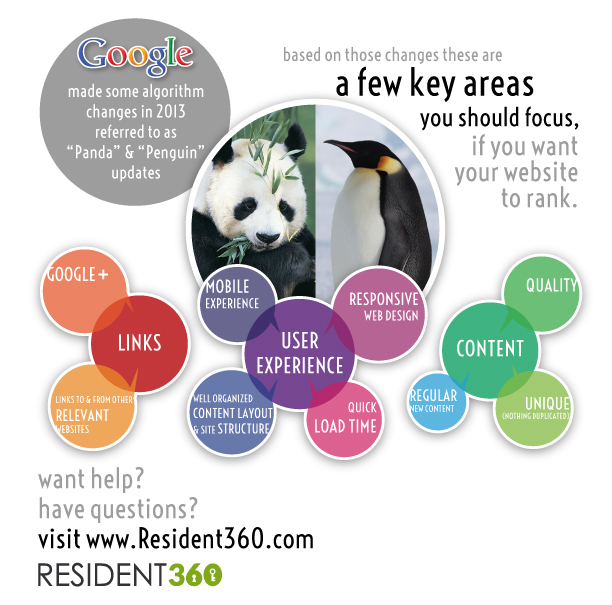Multifamily Blogs
A Brief Guide to Recent Google Algorithm Changes For The Multifamily Industry
A Brief Guide to Recent Google Algorithm Changes For The Multifamily Industry
 Since the inception of Google, its founders have been constantly improving and altering the effectiveness and method of their search engine. Another way to say this is that they regularly roll out algorithm updates that adjust website rankings, with the expressed intention of making the best content available to the people who are looking for it.
Since the inception of Google, its founders have been constantly improving and altering the effectiveness and method of their search engine. Another way to say this is that they regularly roll out algorithm updates that adjust website rankings, with the expressed intention of making the best content available to the people who are looking for it.
Panda, Penguin & Spring Cleaning
In February, there was Panda and now there’s Penguin, but really what you need to know is that Google has been trying to clean up web spam and give bonus points to those who create meaningful, original content and provide real value to real humans.
If you or your website or SEO company has been using “black hat” techniques, trying to cheat the system, you’ve probably seen your ranking drop. These tactics have been intentionally targeted by Google in order to reward sites that are created by real people and for real people (not by or for spam bots).
There’s quite a lot of info on the internet about these latest changes, but if you’re in the multifamily business and what you need are leads, not all of that applies to you.
If you want your website to rank because that equals more traffic, which equals more leads…
These are the most important things you need to be aware of:
- User Experience Matters. Your website needs to load fast and provide a quality experience on every device size. This means your website must be RWD (Responsive Web Design) and must be built with high quality behind-the-scenes architecture to get the Google love. SEO starts with how your site is built in the first place, not just making changes after the fact. Investing in a new RWD website makes more sense than paying someone to mess around with your current site in the name of SEO.
- Content must be unique, valuable and posted regularly if possible. First, make sure there is quality, relevant words on your webpage so that the Google bots can crawl your site and know what it’s about, AND so that users can have clarity and access to meaningful information. For apartment communities, a Resident Blog is great way to offer value to your residents with current events and local information as well as pay your dues to Google by providing a continual stream of new, unique content.
- Avoid “duplicate content” like the plague. Not only is basically plagiarism, it will harm your site ranking. Don’t do it.
- Set up your Google+ profile and page. You can’t ignore Google Plus anymore. It IS going to take over the world. Most people have a basic understanding that when your links are shared on social media that’s a good thing. This is true. However, Google + is not just another social media toy. It’s now a key component to a high-ranking website.
There are many more changes that may affect your apartment website, but these are the items that I think are not only the most important, but also the ones you probably have the most control over.
I’m writing another article with some easy explanations of basic SEO terms. Let me know in the comments if there’s any SEO terms that you find particularly strange, confusing or funny.
It will be interesting to see how Google continues to develop these spam-resistant algorithms, and in turn…. how spammers find new ways to get around them. I for one, am looking forward to less ‘web junk’ in my searches. Happy Friday!

